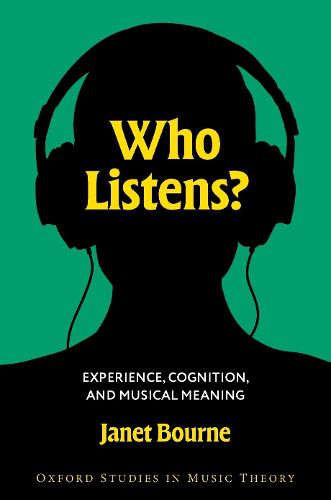Readings Newsletter
Become a Readings Member to make your shopping experience even easier.
Sign in or sign up for free!
You’re not far away from qualifying for FREE standard shipping within Australia
You’ve qualified for FREE standard shipping within Australia
The cart is loading…






Imagine someone who attended a Beethoven Symphony in 1805. Now imagine a listener attending the same symphony today. Both create meanings by relying on previous experiences, but no one assumes they leave their concerts with the same experience. Yet, when analyzing music, we often rely on "ideal listeners," presuming all have the same experience. Who Listens? Experience, Cognition, and Musical Meaning is a fascinating look into the importance of who is listening and how. Author Janet Bourne presents a new set of cognitively-based tools for analyzing music from the perspective of the listener.
This book shows how listening is an active and creative act, and that many people make sense of music largely by drawing on their previous experiences, particularly experiences with music. According to research in cognitive science, listeners use a musical form of analogy and categorization to relate what they previously heard to what they hear in the moment. To demonstrate that listeners draw on this experience to perceive meaning when listening, Bourne combines music analytic tools, empirical psychological methods, and reception history. Drawing on analogy and categorization, Bourne has designed cognitively-based tools for analyzing music from the perspective of the listener to create different interpretations for different listeners.
While Part 1 outlines the analytical tools, Part 2 analyzes pieces by Beethoven from the perspective of three groups of listeners: Beethoven's early 19th-century contemporaries; late 20th- and 21st-century musicians and music scholars; and 21st-century film-goers. In so doing, this book illuminates how musical meanings change when considering different listeners' backgrounds and ways of listening, giving voice to overlooked reception histories and musical meanings.
$9.00 standard shipping within Australia
FREE standard shipping within Australia for orders over $100.00
Express & International shipping calculated at checkout
Imagine someone who attended a Beethoven Symphony in 1805. Now imagine a listener attending the same symphony today. Both create meanings by relying on previous experiences, but no one assumes they leave their concerts with the same experience. Yet, when analyzing music, we often rely on "ideal listeners," presuming all have the same experience. Who Listens? Experience, Cognition, and Musical Meaning is a fascinating look into the importance of who is listening and how. Author Janet Bourne presents a new set of cognitively-based tools for analyzing music from the perspective of the listener.
This book shows how listening is an active and creative act, and that many people make sense of music largely by drawing on their previous experiences, particularly experiences with music. According to research in cognitive science, listeners use a musical form of analogy and categorization to relate what they previously heard to what they hear in the moment. To demonstrate that listeners draw on this experience to perceive meaning when listening, Bourne combines music analytic tools, empirical psychological methods, and reception history. Drawing on analogy and categorization, Bourne has designed cognitively-based tools for analyzing music from the perspective of the listener to create different interpretations for different listeners.
While Part 1 outlines the analytical tools, Part 2 analyzes pieces by Beethoven from the perspective of three groups of listeners: Beethoven's early 19th-century contemporaries; late 20th- and 21st-century musicians and music scholars; and 21st-century film-goers. In so doing, this book illuminates how musical meanings change when considering different listeners' backgrounds and ways of listening, giving voice to overlooked reception histories and musical meanings.